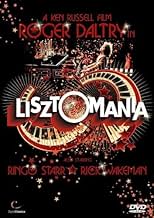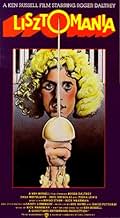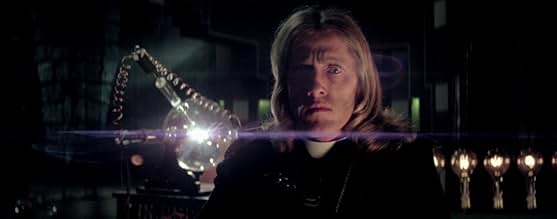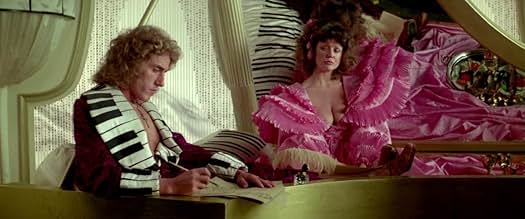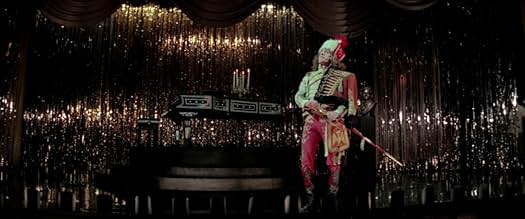VALUTAZIONE IMDb
6,1/10
3279
LA TUA VALUTAZIONE
La vita e soprattutto gli amori del compositore ungherese Franz Liszt, raccontati nei termini di un moderno musicista rock.La vita e soprattutto gli amori del compositore ungherese Franz Liszt, raccontati nei termini di un moderno musicista rock.La vita e soprattutto gli amori del compositore ungherese Franz Liszt, raccontati nei termini di un moderno musicista rock.
- Regia
- Sceneggiatura
- Star
Recensioni in evidenza
The film suffers from atrocious vulgarization in very bad style and taste throughout, which is a pity, because the idea is not bad at all. Liszt and Wagner are portrayed in gross caricature, which they were already while they were alive and kicking, and just like the 19th century caricatures even these modern ones do not miss their target and actually pinpoint some obvious truths about these the greatest divas among composers in monstrous vanity and atrocious hubris. Liszt was the more sympathetic and actually fell a prey and victim to the ruthlessness of Wagner ending up as a trophy in his graveyard, while the depicting of Wagner as a vampire and prelude to Hitler, his Frankenstein monster, is not altogether maladroit. In certain aspects it actually hits the nail. The unnecessary hooliganism of the film is the corruption of the music, which really is very little Liszt and Wagner but the more Rick Wakeman in horrible disfigurement in pop and rock versions. This is not a music film or any kind of biography or documentation of great composers but rather a twisted parasitic phantasmagoria tearing classical music apart and more or less destroying it. Ringo Starr as a pope with Liverpool accent doesn't make things any better. It isn't even funny but only stupid and disgusting. although a few laughs must out. Still, because of the idea, the imagination, the great camera work and the brilliant fireworks entertainment, I have to give it 5, which is the lowest I ever rated a film here, and I am very doubtful whether I will see any other of Ken Russell's films on music, no matter how much I appreciated his "Valentino".
Ken Russell did have some interesting ideas that came across as entertaining but there were times where his style got ahead of him and the film in question, and Lisztomania epitomises a bit of both. Lisztomania is definitely a polarising film, people will find it wonderfully weird while others will find it tasteless. With me, both seem to be here which is the main reason why the film is not an easy one to rate. If you are looking for a biographical drama, look elsewhere, the first half does have a story to it(more than likely to be fictionalised though) but the second half is like you've having a long really surreal dream and the characters are merely parodies. There are some striking visuals that are colourful and surreal while the music is pulsating and catchy and there is evidence of wit and imaginative touches like the homage to Charlie Chaplin and Hammer films, the fantasy interlude, Liszt's arrival at the castle and the Frankenstein figure(though that may also come under vulgar too because it's Wagner and the Nazis). Fiona Lewis and Veronica Quilligan are good as well. Some of it can feel music-video-like though- much of the second half has very little plot and feels like an excuse to string different vignettes together with a lot of tone shifts- and while the special effects are mostly okay the spaceship is rather fake. Lisztomania does change tone a lot and some of the shifts come without warning and feel very chaotic and there are some touches that are vulgar like the piano torture machine, the giant penis, sex scenes at high speed, Nazi iconography. Not entirely which category the vaginal fantastic voyage comes under, visually it was imaginative but there was a real weirdness as well, the same could be said of the most unique version of the Pope you will ever see. Most of the acting is really not very good, Paul Nicholas is pretty awful, Ringo Starr has a naturalness but doesn't have much to do and Roger Daltry is rather dull. Russell has shown with his Elgar and Delius biographies that he can be restrained and Mahler also(though also with some outrageous images), but Lisztomania is the prime example that I've seen of his filmography where restraint and subtlety go completely out the window, and at times it can feel heavy-handed. Overall, very difficult to rate but is unlike many other films seen before, personally not entirely sure whether I liked or disliked it, most likely to be neither. 5/10 Bethany Cox
A wild, surreal, profane, provocative, bawdy, debauched, baroque, rock n' roll pop musical fantasy with anachronistic abstractions, Chaplin references and a depiction of the Golem as a lumbering Nazi Frankenstein wreaking havoc amidst a soundtrack of Wagnerian dread. Suffice to say, Lisztomania (1975) is as far from conventional cinema as you could possible get, illustrating Russell's further shift into more self-indulgent territory and away from his more sensitive earlier work with films such Elgar (1962), The Debussy Film (1965), Delius; Song of Summer (1968) and the controversial Women in Love (1969). The seeds of Lisztomania can be seen in many of these films, in particular, in Russell's fairly unique way of seeing the past by way of the present; investigating historical figures, writers, artists and composers as if modern-day pop icons. Here, Russell takes that notion and applies it to an incredibly distinctive visual perspective that attempts to underpin the spiralling confusion of the artist's life and work in such a way as to be just as stimulating and sensory for the audience as it is for the character himself.
The style that Russell employs on Lisztomania is characteristic of the mid-to-late period of his career, featuring cluttered cinemascope compositions, a juxtaposition of various film speeds, colours and textures, a general mix of established actors, pop-stars and amateurs, a complete disrespect for the artist and their work, for the period in which the film is set and for the general accepted conventions of traditional, biographical film-making. Personally, I welcome the sense of anarchy; with Russell getting away from the clichés that ultimately lead to films like Ray (2004) and Walk the Line (2005) and presenting a film that is - for better or worse - completely unique. Once again, the approach that Russell adopts for Lisztomania can be seen in many of his preceding films, going as far back as his ultimate masterpiece The Devils (1971); a gloriously over-the-top, pop-art inspired political horror story with a fitting subversion of various religious iconography. This led on to his film about the artist and sculptor Henri Gaudier, which featured the same depiction of a historical figure as an almost Bob Dylan like revolutionary amidst scenes of perverse invention and screaming, pop-art expression.
Subsequent music-based features like the underrated Mahler (1974) and the financially successful version of The Who's celebrated "rock opera" Tommy (1975) continued the evolution of Russell from sensitive young provocateur to grand purveyor of lurid, over-the-top kitsch. Tommy is really the definite precursor to Lisztomania, not least because of the return of Roger Daltrey in the lead role, but in the almost kaleidoscopic fantasia of scenes within scenes creating miniature vignettes that propel the story in such a way as to suggest a compilation of music videos. The scenes of Liszt giving his first musical performance are reminiscent of the "Pinball Wizard" segment of the aforementioned film, whilst also showing the attempt by Russell to turn the composer into a 19th century Marc Bolan type figure, with inventive stage shows, manic energy, wild charisma and a packed stadium filled with screaming teenage girls waving scarves and blowing whistles. There's also some subtle comment on the music industry and the relationship between the artist and the press; reminding us that Lisztomania is, above all else, an absurdist satire.
Nonetheless, attempts to pigeonhole the film to a single genre will only lead to failure. If you approach Russell's work with a definite idea of what to expect you'll most probably be bitterly disappointed; with the film confounding all expectations and going against every pre-conceived notion of character, narrative, theme and subject to present a film that is part drug-induced hallucination, part schoolboy w*nk-fantasy. There are elements of science fiction, sex comedy, fantasy and war, and all tied together by Rick Wakeman's bold and subversive treatment of the music. The elements are blended together with a complete disregard for subtly, with outlandish Nazi iconography and apocalyptic despair juxtaposed against the recognisable conventions of the Universal horror movies of the 30's and 40's, alongside a continual reliance on mechanical phalluses, vaginal symbolism, high-speed sex scenes and Daltrey breaking the forth-wall like Timothy Lee in the "Confessions of..." series. If you can appreciate the idea of Fellini directing from a script by Benny Hill, then Lisztomania has a lot to offer. However, it is imperative that you approach Lisztomania on a visual level, as the aspects of script and performance are the factors that ultimately let the whole film down.
Playing a death, dumb and blind kid in Tommy was probably less of a stretch for Daltrey - who was already more than familiar with the subject matter of that particular film - however, as Liszt he's really unable to convey the dynamics of the character or indeed the ability to, well... act! It's clear that Russell's use of pop-stars in the lead roles was an ironic choice - leading into the actual presentation of the text - but the film desperately needed a more experienced and talented actor in the lead to really pull these separate elements together. With Daltrey the film becomes incredibly flawed, which is a shame, as it is obviously a bold, unique and energetic work; maybe even like nothing we've ever seen before! If you can overcome the poor performances, the reliance on visuals over text, and the flippant treatment of the actual historical elements presented by both the characters and the overall theme, then Lisztomania should offer a once in a lifetime, visual experience. If not, it will no doubt remain an unmitigated failure on all counts.
The style that Russell employs on Lisztomania is characteristic of the mid-to-late period of his career, featuring cluttered cinemascope compositions, a juxtaposition of various film speeds, colours and textures, a general mix of established actors, pop-stars and amateurs, a complete disrespect for the artist and their work, for the period in which the film is set and for the general accepted conventions of traditional, biographical film-making. Personally, I welcome the sense of anarchy; with Russell getting away from the clichés that ultimately lead to films like Ray (2004) and Walk the Line (2005) and presenting a film that is - for better or worse - completely unique. Once again, the approach that Russell adopts for Lisztomania can be seen in many of his preceding films, going as far back as his ultimate masterpiece The Devils (1971); a gloriously over-the-top, pop-art inspired political horror story with a fitting subversion of various religious iconography. This led on to his film about the artist and sculptor Henri Gaudier, which featured the same depiction of a historical figure as an almost Bob Dylan like revolutionary amidst scenes of perverse invention and screaming, pop-art expression.
Subsequent music-based features like the underrated Mahler (1974) and the financially successful version of The Who's celebrated "rock opera" Tommy (1975) continued the evolution of Russell from sensitive young provocateur to grand purveyor of lurid, over-the-top kitsch. Tommy is really the definite precursor to Lisztomania, not least because of the return of Roger Daltrey in the lead role, but in the almost kaleidoscopic fantasia of scenes within scenes creating miniature vignettes that propel the story in such a way as to suggest a compilation of music videos. The scenes of Liszt giving his first musical performance are reminiscent of the "Pinball Wizard" segment of the aforementioned film, whilst also showing the attempt by Russell to turn the composer into a 19th century Marc Bolan type figure, with inventive stage shows, manic energy, wild charisma and a packed stadium filled with screaming teenage girls waving scarves and blowing whistles. There's also some subtle comment on the music industry and the relationship between the artist and the press; reminding us that Lisztomania is, above all else, an absurdist satire.
Nonetheless, attempts to pigeonhole the film to a single genre will only lead to failure. If you approach Russell's work with a definite idea of what to expect you'll most probably be bitterly disappointed; with the film confounding all expectations and going against every pre-conceived notion of character, narrative, theme and subject to present a film that is part drug-induced hallucination, part schoolboy w*nk-fantasy. There are elements of science fiction, sex comedy, fantasy and war, and all tied together by Rick Wakeman's bold and subversive treatment of the music. The elements are blended together with a complete disregard for subtly, with outlandish Nazi iconography and apocalyptic despair juxtaposed against the recognisable conventions of the Universal horror movies of the 30's and 40's, alongside a continual reliance on mechanical phalluses, vaginal symbolism, high-speed sex scenes and Daltrey breaking the forth-wall like Timothy Lee in the "Confessions of..." series. If you can appreciate the idea of Fellini directing from a script by Benny Hill, then Lisztomania has a lot to offer. However, it is imperative that you approach Lisztomania on a visual level, as the aspects of script and performance are the factors that ultimately let the whole film down.
Playing a death, dumb and blind kid in Tommy was probably less of a stretch for Daltrey - who was already more than familiar with the subject matter of that particular film - however, as Liszt he's really unable to convey the dynamics of the character or indeed the ability to, well... act! It's clear that Russell's use of pop-stars in the lead roles was an ironic choice - leading into the actual presentation of the text - but the film desperately needed a more experienced and talented actor in the lead to really pull these separate elements together. With Daltrey the film becomes incredibly flawed, which is a shame, as it is obviously a bold, unique and energetic work; maybe even like nothing we've ever seen before! If you can overcome the poor performances, the reliance on visuals over text, and the flippant treatment of the actual historical elements presented by both the characters and the overall theme, then Lisztomania should offer a once in a lifetime, visual experience. If not, it will no doubt remain an unmitigated failure on all counts.
I'm a great fan of Ken Russell's films. What I like most about them is the director's ability (and willingness) to totally immerse his productions into whatever mania happens to be the driving force behind its subject. The results are often excellent, occasionally poor. But never have I seen a film that was, at once, so incredibly visionary and God-awful as Lisztomania.
In most Russell films, fantasy takes on an important role in the dramatic narrative. In Lisztomania, the narrative is virtually jettisoned in favor of fantasy, and not to altogether admirable effect.
Still, any motion picture that can give us Richard Wagner portrayed as a Transylvanian vampire who gains musical inspiration by sucking the blood of Franz Liszt deserves points for imaginative hubris.
Ultimately, Lisztomania is less a film than a comic boot pastiche. Its humor is, by turns, dazzling and lead-footed. Compared to THE MUSIC LOVERS (another Russell bio-pic, this time about Tchaikovsky), Lisztomania is, for all it gleeful, lip-smacking gusto, a rather tired affair, largely because it's metaphors are so pedantic and literal-minded.
I should point out, however, that Wagner's third-act transformation (or should I say resurrection) into a machine gun-toting, Frankenstein-Hitler rock star (yes, you read correctly) is a genuinely
In most Russell films, fantasy takes on an important role in the dramatic narrative. In Lisztomania, the narrative is virtually jettisoned in favor of fantasy, and not to altogether admirable effect.
Still, any motion picture that can give us Richard Wagner portrayed as a Transylvanian vampire who gains musical inspiration by sucking the blood of Franz Liszt deserves points for imaginative hubris.
Ultimately, Lisztomania is less a film than a comic boot pastiche. Its humor is, by turns, dazzling and lead-footed. Compared to THE MUSIC LOVERS (another Russell bio-pic, this time about Tchaikovsky), Lisztomania is, for all it gleeful, lip-smacking gusto, a rather tired affair, largely because it's metaphors are so pedantic and literal-minded.
I should point out, however, that Wagner's third-act transformation (or should I say resurrection) into a machine gun-toting, Frankenstein-Hitler rock star (yes, you read correctly) is a genuinely
19th century castration fantasy--delineating the extravagance of Hungarian composer Franz Liszt's sex-saturated young life until his eventual death by the symbolic stabbing of a voodoo needle (a myriad of maladies in actual life)--done-up in the spirit of a naughty British schoolboy bored by his classical lessons and entertaining himself by looking up his music teacher's skirts. Writer-director Ken Russell's cartoon-strip nightmare begins promisingly, with a hilarious slapstick joust between Liszt and his lover's husband, the Count d'Agoult (it's a naked swashbuckler, like something from an inventive blue movie). But soon it becomes apparent that Russell's vision is going to be all a pastiche, from silent movies to "Frankenstein" to German Expressionism to bows of unassuming self-reverence. The surreality of Russell's concept doesn't even make sense in the mad forum he has created--there's a narrative thread, yet nothing hangs together--while the creative production design upstages most of the actors. *1/2 from ****
Lo sapevi?
- QuizFirst movie to be encoded with a Dolby Stereo optical soundtrack.
- BlooperDuring the flashback when Liszt is notating the music for Dream of Love; on the second page in the first measure there is the note E-Flat written as an E with the flat symbol next to it. However, since the song is already in the key of A-Flat which includes E-Flat in the scale, it is not necessary to notate the Flat symbol next to the E note. This is only done if the previous E-note was notated as an E-Natural and even then the flat symbol would be placed in parenthesis.
- ConnessioniFeatured in Hollywood Singing & Dancing: A Musical History - 1970's (2009)
- Colonne sonoreRienzi/ Chopsticks Fantasia
Composed by Richard Wagner and Franz Liszt
I più visti
Accedi per valutare e creare un elenco di titoli salvati per ottenere consigli personalizzati
- How long is Lisztomania?Powered by Alexa
Dettagli
- Data di uscita
- Paese di origine
- Lingua
- Celebre anche come
- Litzomania
- Luoghi delle riprese
- Aziende produttrici
- Vedi altri crediti dell’azienda su IMDbPro
- Tempo di esecuzione1 ora 43 minuti
- Mix di suoni
- Proporzioni
- 2.35 : 1
Contribuisci a questa pagina
Suggerisci una modifica o aggiungi i contenuti mancanti

Divario superiore
By what name was Lisztomania (1975) officially released in India in English?
Rispondi

